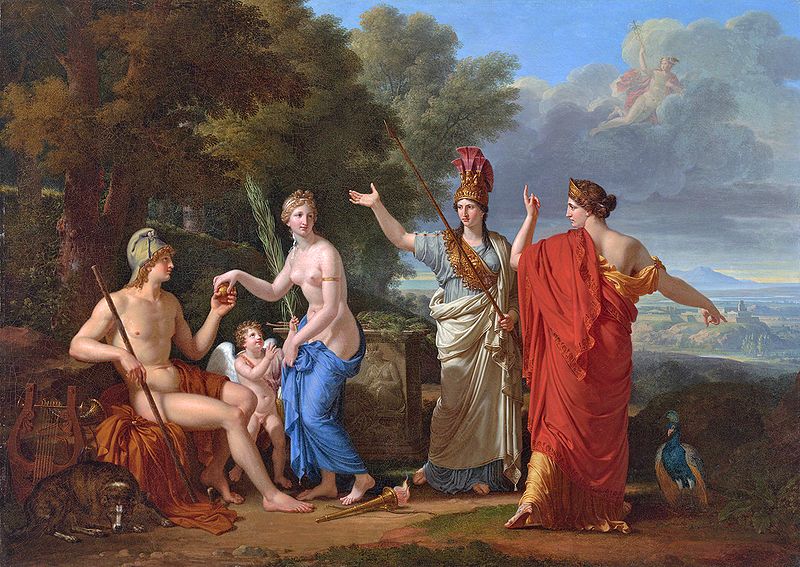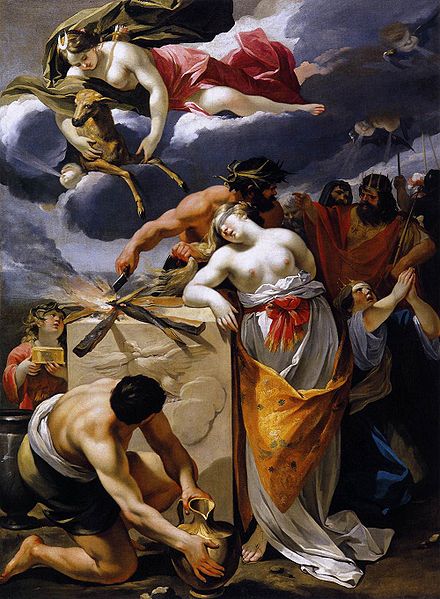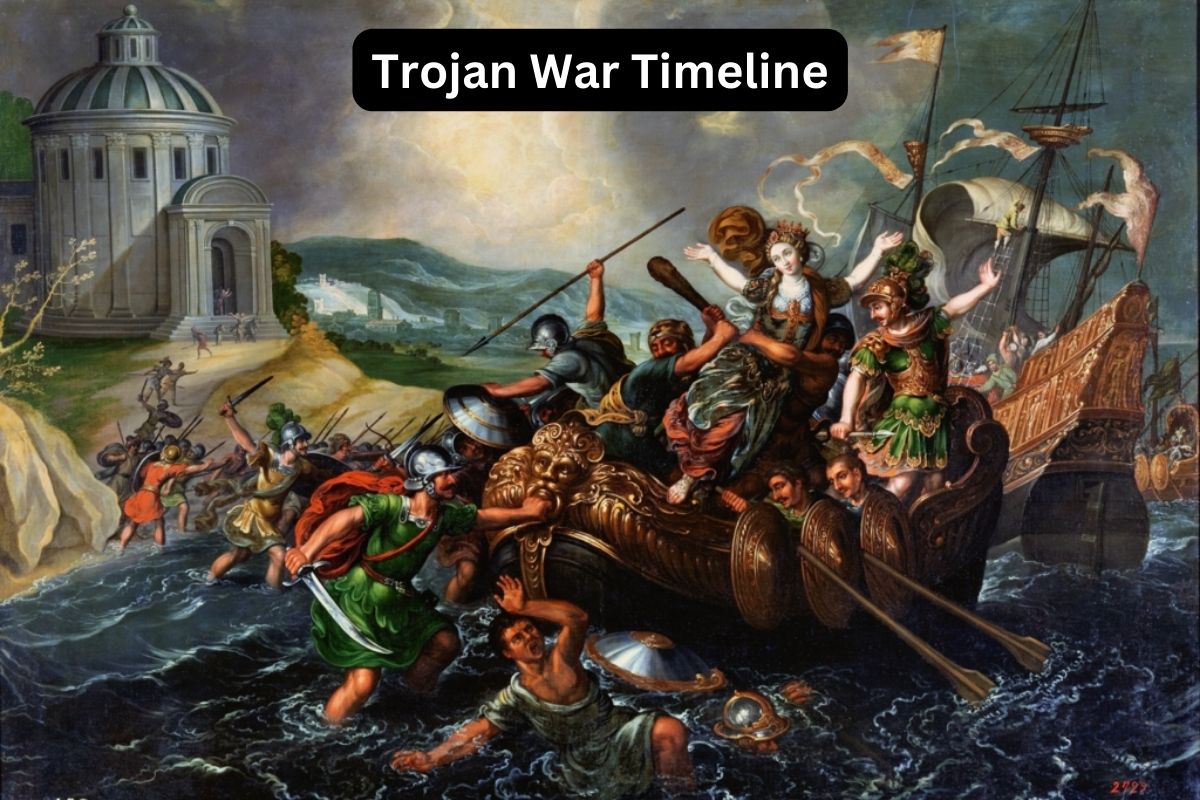The Trojan War is a legendary conflict that is believed to have taken place in ancient Greece around the late 13th or early 12th century BCE. It is primarily known through myths, epic poems, and historical accounts passed down through generations.
The war was triggered by the abduction of Helen, the wife of Menelaus, by Paris, a prince of Troy. In response, the Greek city-states formed a coalition led by Agamemnon and embarked on a ten-year-long siege of Troy.
The war is filled with epic heroes, dramatic battles, and strategic events such as Achilles’ wrath, Hector’s defense of Troy, and the cunning Trojan Horse.
The war culminated in the fall of Troy and the eventual return of the Greek heroes to their homelands, marking the end of this mythical and legendary conflict.
| Event | Description |
|---|---|
| Judgment of Paris | Paris awards a golden apple to Aphrodite, promising him the most beautiful woman in the world. |
| Helen’s abduction | Paris elopes with Helen, the wife of Menelaus, and takes her back to Troy. |
| Greek preparations | Menelaus calls for a Greek coalition to seek revenge against Troy. |
| Sacrifice of Iphigenia | Agamemnon sacrifices his daughter Iphigenia to appease the gods for favorable winds. |
| The Greek expedition | The Greek fleet, led by Agamemnon, sets sail across the Aegean Sea to lay siege to Troy. |
| The Trojan War begins | The Greeks and Trojans engage in a ten-year-long war with various battles and events. |
| Epic heroes and events | Notable events include Achilles’ wrath, Hector’s defense of Troy, the duel between Paris and Menelaus, etc. |
| Fall of Troy | The Greeks use the Trojan Horse stratagem to infiltrate Troy, capture the city, and destroy it. |
| Return of the Greek heroes | The surviving Greek heroes embark on their journeys back home, facing challenges and adventures along the way. |
Timeline of the Trojan War
1. Judgment of Paris
The story begins with a divine beauty contest known as the Judgment of Paris.
Eris, the goddess of discord, throws a golden apple inscribed with the words “To the fairest” among the three goddesses: Hera, Athena, and Aphrodite.
Also Read: Facts About the Trojan War
Zeus appoints Paris, a prince of Troy, as the judge to determine the most beautiful goddess. Each deity tries to bribe Paris with promises.
In the end, Paris chooses Aphrodite, who offers him the love of the most beautiful mortal woman, Helen.

2. Helen’s abduction
Paris, influenced by Aphrodite’s promise, travels to Sparta, where he encounters Helen, the wife of Menelaus and the most beautiful woman in the world.
Also Read: Sparta Facts
Paris and Helen fall in love, and Paris persuades her to leave Menelaus and accompany him back to Troy. Their actions lead to Helen’s abduction, which becomes the focal point for the start of the war.
3. Greek preparations
Menelaus, outraged by the abduction of his wife, seeks justice and calls upon the Greek city-states to honor their oaths and join him in a campaign against Troy.
Also Read: Trojan Horse Facts
This call to arms gives rise to the formation of a Greek coalition led by Agamemnon, the powerful king of Mycenae and Menelaus’ brother. Agamemnon rallies the forces of various Greek city-states, such as Sparta, Mycenae, Athens, and others, to assemble a formidable army and fleet.
The Greek preparations involve amassing troops, gathering supplies, and constructing a massive fleet of ships at the port of Aulis.
Agamemnon’s leadership and Menelaus’ personal motivation to retrieve Helen provide the impetus for the Greeks to embark on a long and arduous journey across the Aegean Sea towards the shores of Troy, setting the stage for the epic conflict that would follow.
4. Sacrifice of Iphigenia
As the Greek fleet gathers at the port of Aulis, they encounter unfavorable winds that prevent their departure for Troy.
Agamemnon seeks guidance from an oracle and learns that to appease the gods and obtain favorable winds, he must sacrifice his own daughter, Iphigenia. Reluctantly, Agamemnon agrees to the sacrifice, and Iphigenia is slain.
This tragic event serves as a pivotal moment in the Greek preparations and highlights the sacrifices made for the sake of the war.

5. The Greek expedition
With the sacrifice of Iphigenia, the winds change in favor of the Greek fleet. They set sail across the Aegean Sea and embark on the expedition to lay siege to Troy.
The Greek army is led by powerful warriors and heroes, including Agamemnon, Menelaus, Achilles, Odysseus, Ajax, and many others. The fleet comprises numerous ships carrying soldiers, supplies, and provisions for the long war ahead.
6. The Trojan War begins
Upon arriving at Troy, the Greeks begin their siege, surrounding the city and attempting to breach its walls. The war lasts for a period of ten years, during which various battles, skirmishes, and notable events occur.
The Iliad, attributed to the poet Homer, describes some of the key moments and conflicts that take place during the war, showcasing the valor, heroism, and tragic aspects of the Greek and Trojan warriors.
The Greek expedition to Troy marks the commencement of the legendary Trojan War. The war’s duration and the hardships faced by both the Greeks and Trojans contribute to the epic nature of the conflict.
The determination of the Greeks, fueled by their desire for justice and the recovery of Helen, clash with the defensive efforts of the Trojans, who strive to protect their city and honor.
The Greek expedition sets the stage for the epic battles, heroic confrontations, and the unfolding of fate that would shape the course of the war.

7. Epic heroes and events
The Trojan War is filled with epic heroes and significant events that shape the course of the conflict. One of the central figures is Achilles, the greatest Greek warrior known for his unmatched skill and courage in battle.
However, Achilles becomes embroiled in a personal feud with Agamemnon, leading to his withdrawal from the fighting and causing a significant setback for the Greeks.
Other heroes play pivotal roles as well. Hector, the eldest son of King Priam of Troy, emerges as the Trojan champion, defending his city with valor and skill. The duel between Hector and Achilles stands out as a dramatic clash of these two formidable warriors.
Additionally, legendary figures like Ajax, Diomedes, Odysseus, and others contribute their own heroic deeds and strategic maneuvers throughout the war.
The war is marked by numerous battles, skirmishes, and moments of intense conflict. The Iliad recounts the events surrounding the Greek siege, including the battles for the city’s walls, the fighting in the open field, and the clashes between individual warriors seeking glory. The valor and tragedy of these heroes create the backdrop for the ultimate fate of Troy.

8. Fall of Troy
As the war reaches its climax, the Greeks devise a cunning plan to infiltrate Troy and bring about its downfall. They construct a massive wooden horse, known as the Trojan Horse, and leave it outside the gates of Troy as if it were an offering or a symbol of victory.
The Trojans, unaware of the Greek soldiers hidden inside, bring the horse within the city walls.
Under the cover of night, the Greek warriors hidden within the Trojan Horse emerge and open the gates of Troy. The Greek fleet, which had seemingly retreated, returns and launches a surprise attack. Troy is engulfed in chaos as the Greeks sack the city, wreaking havoc and destruction.
The fall of Troy signifies the end of the war and the fulfillment of the Greek desire for vengeance.
9. Return of the Greek heroes
Following the fall of Troy, the surviving Greek heroes embark on their journeys back to their respective homelands. Their returns are marked by various challenges and adventures, which are chronicled in Homer’s epic poem, the Odyssey.
The hero Odysseus, in particular, faces a long and arduous journey filled with mythical creatures, temptations, and obstacles as he strives to return to his wife Penelope and his kingdom of Ithaca.
The return of the Greek heroes serves as a denouement to the epic tale of the Trojan War. It highlights the enduring struggles and triumphs faced by these legendary figures even after the conflict’s resolution, showcasing the complexities of their character and the consequences of their actions.
These events within the Trojan War, the heroism of its figures, and the fall of Troy itself have captivated audiences for centuries, shaping the foundation of ancient Greek mythology and leaving a lasting impact on Western literature and culture.
